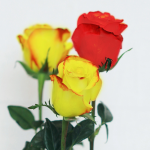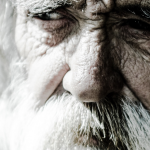The dead line up for the soup, and we have run out of china bowls. Mummy hisses: I am too slow and Helga is blowing bubbles. The icy water doesn’t cut through the mutton grease, but washing up is better than their dirty jokes and nasty ‘thank you’s. Dozens of mass-gravers climb on the dishes to lick the leftovers. They’re ravenous acorns held together with toothpicks, their old bodies pulverised by a direct hit. ‘Shoo, shoo’, Helga doesn’t like the look of them. Next they lose balance, and, oh no, the whole lot crashes on the floor. Mummy hisses again: good china, their wedding present, but it’s not my fault, and ‘Do they have to come here and upset everything and have us wait on them hand and foot?’ I don’t say it out loud, but she is furious.
We do, yes, we have to, for as long as this house, re-mortgaged, leaking, built on a land taken from other people in an unjust war, stands here, at the edge of the woods, smack in the middle of the path to the deadland. The soup kitchen is also her self-punishment. She boils the stock bones for hours, cries over the onions. Why can’t I do more? Don’t I understand people are dying. Some of the dead smoke cheap tobacco that aggravates her asthma, and instead of asking them to stop she opens the window beside the stove; the wind is blowing in cold leaves and she coughs more.
Suddenly I am not worthy to wash dishes with little Helga. ‘Kaa-reen’. Mummy shouts through her fits of cough and the whirls of dead men’s smoke. ‘Karen, come here, now. Go play with the children’.
I don’t want to. I really, really don’t want to.
The children are busy killing a moth. They torture it a bit more, to see me squirm. Next comes a game with ropes, stones, and me being stupid and making them lose. They’re all angry – grown-ups, kids; it’s always there bubbling under the surface.
‘Did you talk to her?’ They point to a girl at the ditch.
‘No.’
‘Good, stay well away’
‘Why?’
‘Nothing you and your family would understand.’
‘Want to know something? She ate a dead cat once’
‘She did, for a bet’.
‘Yes – and that’s how she got sick and died. And she’s nasty.’
‘She’s been hanging around your toilet.’
Our toilet, one of their obsessions, is outside, beside a ditch, the space around it all nettles and burdock leaves.
I approach her. The ditch water is pitch-black. I don’t see our reflections. She looks up, smiles and invites me to play. Half her face is missing, but the game she makes up is all right. We dig shallow trenches all over the garden, avoiding the others and the smoky pyres the grown-ups have set up to warm themselves. We stop at the gate beside the road.
My father used to say: ‘never cross it, under any circumstances.
Disobeying him feels doubly wrong because he is gone. He is also dead, I suppose, but not like those others; he’d never queue for soup, unless he took another road past another station.
‘We should cross it and go to the woods’, she says.
There are no traffic lights. Monster trucks whizz by at horrid speeds, and in between I can see faint blotches of the dead slowly oozing past. How does one avoid them all?
‘Wait’, I say, ‘tell me, is it true what they say, about you eating the dead cat?’
I half-know it isn’t; I know by her face: she was killed in the war like most of them.
She laughs: ‘That would be brave, but how would I know.’
They have no memories, she explains, they are just are, and, anyway, I am missing the point. And the point is she hates the grown-ups that mind her.
‘The woman is nasty’, she says. ‘And the man tries to look up my skirt half the time’.
Her legs are withered, her skirt is ragged. I feel terribly angry at her grown-ups.
Back in the kitchen, Mummy wants to absorb all their troubles, to give them all. They mistake it for flirtation and snigger behind her back. And when it gets late, Mummy will fall asleep on the long bench in the kitchen, right in front of everyone. Helga and I will be stuck with a dirty, raw evening. The full-bodied guys will pocket cutlery, and the mass-gravers will scuttle in the corners. I’ll say: ‘Go to bed’, and Helga will sob because I don’t know how to lighten things and make them fit Mummy’s vision of hard work and charity.
‘Yes’, I say. ‘Let’s cross it’.
We run as fast as we can. Across the road, all is quiet, all streaming upwards, the trees, their branches, our laughter, all running up and up, and the leaves are falling, and we fall into the piles and roll about. The house is not here anymore. My friend is different now; the disfigured face is gone, and the ragged clothes, but she’s not here all the time. Most of the time she is thoughts in my head, but she makes up great games, with pirates in them, and archery, and climbing trees like horses.
She says she might stay here, let her grown-ups trudge to the deadland. She feels good here. It’s getting dark, so I help her and pile leaves on top of her voice. She laughs, and now I have to cross the road alone.
The trucks are racing by, and the dead are flickering in the headlights, but I’ll make it. It’s not long now till the end of November, and then the last of the dead stragglers will leave. Mummy might get some rest. The pension money will come in, and we might travel to the city in December. And we’ll be fine; we’re alive.
…
Biography
Roppotucha Greenberg writes micro-fiction on Twitter (@Roppotucha). Her stories have appeared or are forthcoming in Ad Hoc Fiction (winners’ section) The Evening Theatre, Elephants Never, 101 Fiction, Former Cactus, TSS Publishing
(The BIFFY50 competition runner up). She lives in Ireland and doodles magic creatures patreon.com/Roppotucha/
Image: unsplash.com





